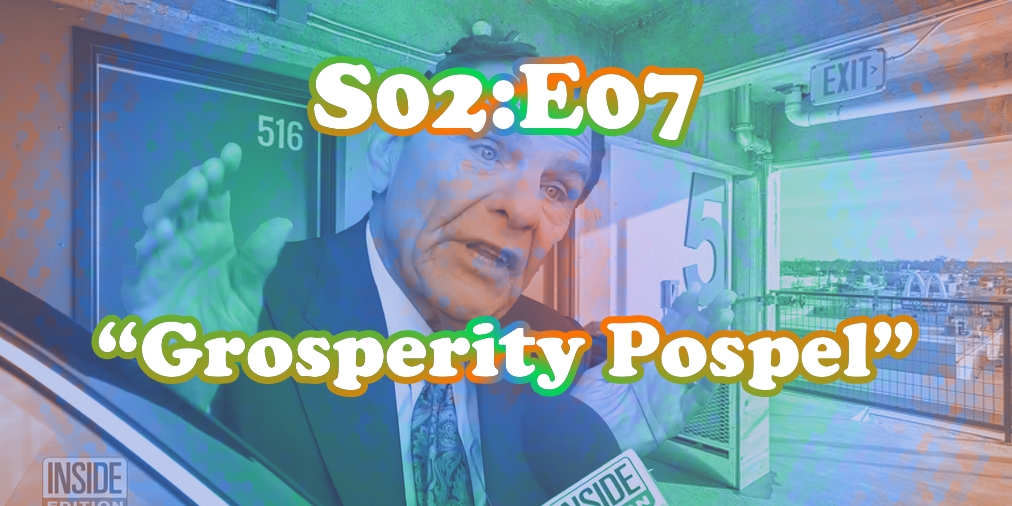I Have No Idea What I'm Doing
-

- Hosted by Andrew Huster and Aaron LM Goodwin
Join us on a wondrous journey through whatever’s on our minds this week. We have no idea what we’re doing. But we’re trying.
We need private jets,,,for our work!
Our Goodstuff Patreon Subscribers and listeners just like you! Support your favorite podcasts directly to get exclusive unedited episodes and more.

Shrimp-tastrophy
Starting in the early 1960s, California and Nevada’s departments of Fish and Game (now the California Department of Fish and Wildlife and the Nevada Department of Wildlife) released mysis shrimp into Lake Tahoe in hopes that they would be a new and abundant food source for the lake’s fish.
“The idea was, if you introduce something that fish could eat, fish would get bigger and fishermen would be happier,” said Tahoe Environmental Research Center Director Geoff Schladow. “So what could possibly go wrong with that?”
A lot, it turns out.
“This is something everybody may have missed,” Schladow said. “I think for a long time.” …
Before the shrimp were introduced into Tahoe, zooplankton in the lake ate algae and sediment, clearing the water by doing so. Some fish also ate the zooplankton. Then the states introduced the shrimp, and everything changed. The shrimp hate light, and because Lake Tahoe is so clear, they have to retreat to the depths of the lake during the day to avoid it. Then, each night, they undertake a round-trip migration as long as 2,000 feet to the top of the water to feed. Once the sun rises again, they swim back down.
While officials put the shrimp in the lake in the hopes of fish eating them, that hasn’t been the case because of this nightly vertical migration. …
Not only did the shrimp not fulfill their intended role, but they also brought a devastating and unintended consequence.
After the shrimp migrate each night, they’re starving from the long journey. Because of this, they’ve managed to decimate their main food source in Lake Tahoe: native zooplankton.
These zooplankton were an important food source for the kokanee, and the size of those fish in Lake Tahoe has dropped dramatically since the shrimp were introduced. But these tiny creatures that the shrimp were devouring, called Daphnia, were also keeping the lake clean, researchers found out.
“As far as zooplankton in Lake Tahoe go, Daphnia is responsible for removing about 85% of the particles and algae from the water column,” said Katie Senft, one of the researchers on Allen’s team.
The YOUTHS are tracking each other?
Which brings us to the more curious kind of location-sharing: the ambient, always-on kind. At baseline, your friends’ location is just another piece of information about them, another point of connection, or an excuse to talk to them. You can see whether they happen to be nearby, and have a happy chance meeting. This is a particularly common scenario in college, where people are likely to be within a small, bounded area.
Spice Rankings
Ranking Spices by How Healthy They Are - MEL Magazine
Weird Way to do Public Housing, But Okay
- San Mateo cops have been sleeping in their cars to avoid an hours-long commute at the end of a 12-hour shift. The city plans to convert a portion of an old fire station into a sleeping barracks for far-flung officers who can’t afford the extremely expensive housing in the area.
For San Mateo police Officer Jeff Brinton, the 85-mile commute from Oakley was so punishing that he decided to pursue the only reasonably affordable solution he could think of: He now sleeps in a van.
Rather than slog back and forth from eastern Contra Costa County between shifts — a trip that can take 2½ hours during rush hour — he crashes in his Roadtrek van, which he parks in the employee lot at the San Mateo police headquarters.
Brinton said he is hardly the only member of the force who slumbers in a vehicle rather than drive several hours after a 12-hour workday.
“A lot of (officers) are sleeping in their cars if they get too tired — it’s dangerous to drive home,” said Brinton.
But Brinton may soon get some relief from his commuting nightmare. On Monday, the San Mateo City Council unanimously approved a plan to convert a portion of an old fire station into a sleeping barracks for far-flung officers who can’t afford the average $1.4 million Peninsula home.
The $520,000 project will provide bunks and showers for up to 12 officers at a time at Fire Station 26 at 1812 S. Norfolk St. In addition to the barracks, the building will be a police substation and vehicle storage site.
While Brinton’s commute may be particularly egregious, it’s not that unusual. Of San Mateo’s 125 officers, 68% live outside of San Mateo County, many as far as Tracy or Mountain House in San Joaquin County or Gilroy in south Santa Clara County.
The cops who sleep in their cars — and what San Mateo is doing about it - SFChronicle.com
Hi, would you like to live in a parking garage?
The Parking Garages of the Future - Governing
Conservatives don’t like colleges because they expose you to the others you’re supposed to be afraid of
- Hatred/fear of The Other rarely survives actual contact and experience with them
https://twitter.com/prageru/status/1164649782490435585
Grosperity Pospel
Like payday lenders, prosperity gospel ministers see the broke and struggling as a consumer market. Their target demographic is those who suffer from lack, and their product is the promise of abundance, or at least relief. Financially, the prosperity gospel is nothing but a swindle, prying money from people who by definition have very little and desperately wish they had more.
Ideologically, the prosperity gospel dovetails perfectly with right-wing ideology, which views poverty as a consequence of individual failure rather than rigged economic and political structures. … When times are hard, it’s because you didn’t think positively enough, pray hard enough, or tithe enough. It’s a spiritual spin on meritocracy, the ideological handmaiden to neoliberal capitalism. The prosperity gospel is one of America’s greatest grifts.
Trump IS a prosperity gospel preacher:
Trump’s spiritual adviser is a prosperity minister. Her name is Paula White. In April of this year, she promised believers that if they sent her money they would receive one of several blessings: God would bring harm to their enemies, assign them a special angel, enhance their prosperity, or increase their inheritance. …
In the relationship between Paula White and Donald Trump, the nature of the prosperity gospel is laid bare. White got famous telling working-class people that their economic insecurity was a personal failing, and in a way, so did Trump. The Apprentice is a show about people dreaming of riches, desperate to prove themselves worthy of success. Most are not, and are punished for their weakness with unemployment. What’s obscured in both instances is that people are poor because people like White and Trump are rich — that they are each beneficiaries of a system that takes from the needy and gives to themselves.
(A Grift from God - Jacobin)
Full Interview: Preacher Kenneth Copeland Defends Lavish Lifestyle - YouTube